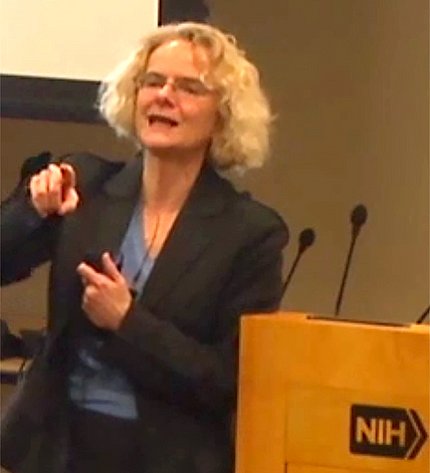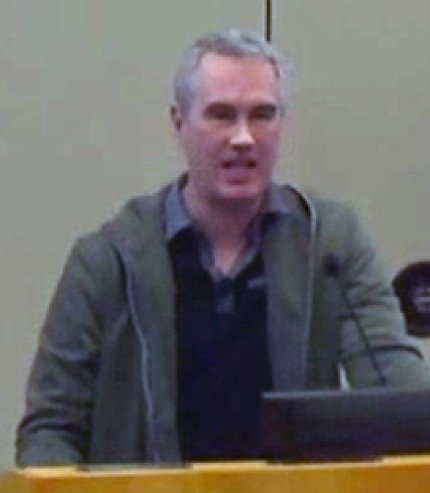Out of Control
Breaking the Biological Cycle of Addiction

The urge is strong to eat that cookie and perhaps another; you can’t resist the temptation. Even before that first sweet bite, the anticipation has stimulated the reward system in your brain. Are we at all in control of our food cravings or are there more powerful forces at work?
The desire for certain foods, especially those high in sugar and fat, in some people can be almost as strong as for drugs of abuse. But while evidence shows addiction is a disease of the brain, “if we believe we are [in control], we are much more likely to have an impact on our behaviors,” said NIDA director Dr. Nora Volkow at a recent Demystifying Medicine lecture in Bldg. 50.
Drugs and foods increase dopamine, a neurotransmitter in the brain associated with reward, triggering processes that lead to conditioning, which in those that are vulnerable can result in addiction, said Volkow. But the dopamine system also has a more primitive function, activating the body’s instinct to seek nutrients for survival and, working in conjunction with hormones and peptides, modulating hunger and satiety.
“So one could say it’s not that food produces addiction, but actually that drugs are hijacking a system that was developed by nature specifically to motivate behaviors needed for survival and to create habits,” Volkow said. “And drugs can more rapidly generate habits that are very difficult to break and also can result in compulsive behaviors more rapidly than food.”
Interestingly, recent studies have shown that dopamine levels didn’t necessarily increase, and sometimes decreased, when drug addicts took an illicit drug or when an obese person consumed food. “There is a marked suppression of the ability of the drug to increase dopamine in the brain of the person who is addicted,” Volkow said. What then would motivate an addict to continue taking the drug or a person to continue eating without the reward experienced upon its consumption?
The answer may lie in the old tale of Pavlov’s dog. The repeated administration of the reward—the drug or the food—creates a conditioned response, said Volkow. Animal and human studies have shown that repeatedly pairing auditory or visual cues with a drug or food will result in dopamine increases just with the presentation of the cue.
But it’s not just the expectation of reward. There’s another biological factor underlying addiction. “In individuals who are addicted to a wide variety of drugs—cocaine, methamphetamine, alcohol, heroin, nicotine—consistently we observed a decrease in the level of dopamine D2 receptors in the striatum of the human brain,” said Volkow.
The same held true in obesity research. Morbidly obese people had significantly reduced striatal D2 receptors, making them more prone to compulsive behavior. What’s driving this compulsion? The lower level of striatal D2 reduces the baseline activity of the frontal areas of the brain that are needed for executive function, including self-regulation.
“If you damage the orbital frontal cortex [most ventral part of the frontal cortex], the cocaine abuser, the alcoholic, the meth abuser is not able to shift the preference of the drug reward for any other [preference], even after it’s been consumed for hours,” she said. “The drug is going to be a main and fixed reinforcer.” This is different from normal function, when the orbital frontal cortex changes the value of the reward as a function of context, such as reducing the motivational value of food when we are no longer hungry, allowing us to focus our attention on an alternative behavior.
Despite our biology, Volkow asserted, “I do believe we are in control at many levels and we have the knowledge to recognize what environments may be pathological and dangerous because they will trigger automatic behaviors such as drug-taking or compulsive overeating.”
Although most conditioned responses are unconscious, Volkow said, our frontal cortex connects not only to reward centers but also to executive control circuits that help us predict situations and control, beforehand, our behaviors.

With obesity, however, there’s another biological process at work. If it wasn’t challenging enough to lose weight in the first place, especially for the obese, the body’s metabolism makes it even harder to keep the weight off. There’s a homeostatic mechanism fighting our weight loss efforts, explained Dr. Kevin Hall, a senior investigator with NIDDK.
To help understand how radical weight loss affects the body, Hall’s team studied a group of contestants from the reality show The Biggest Loser. After months of extreme calorie cutting and daily intense exercise, during which contestants initially were losing a staggering pound a day, most of the weight they lost came from fat mass.
“These folks were able to preserve their lean tissue mass to an extraordinary extent,” said Hall.
Lean body tissue is the most metabolically active, so it came as a surprise that the contestants’ metabolic rate was falling dramatically despite their intensive exercise. After the competition, they couldn’t burn enough calories to maintain their slimmer size and had to dramatically reduce caloric intake just to maintain their current weight.
Six years after the competition, most contestants had regained at least two-thirds of the lost weight, much of it fat mass. But as their weight increased, their metabolisms didn’t recover.
The more people try dieting, the more the body resists, recoiling like a spring to maintain its higher weight. Metabolic changes are proportional to the amount of weight lost, said Hall, noting that The Biggest Loser is an extreme case; not everyone who diets experiences a huge metabolic slowing.
“The people who continue to experience the greatest metabolic adaptation 6 years later are the most successful at maintaining weight loss,” said Hall. “It’s somewhat encouraging that we may have some control over this process.”
As the obesity epidemic continues to grow, there’s a burgeoning need to promote healthier dietary choices. We can create an environment where obesogenic food isn’t so readily available, suggested Volkow. “And we can create health policy interventions that can protect the population from the adverse effects of very powerful food rewards.”
